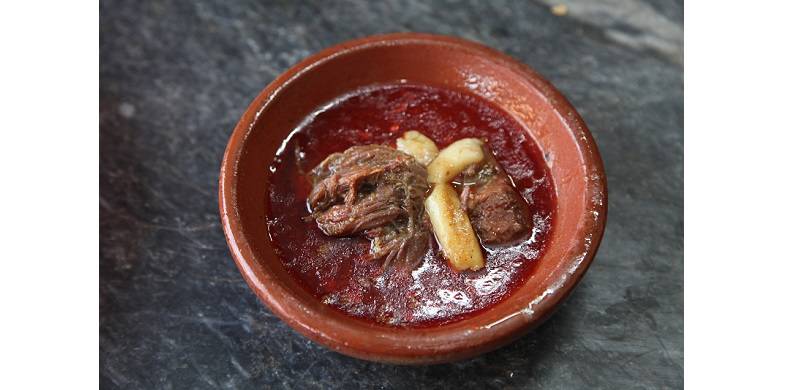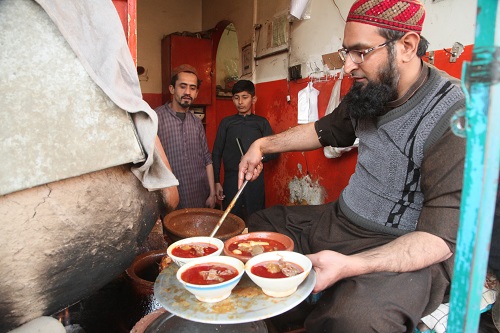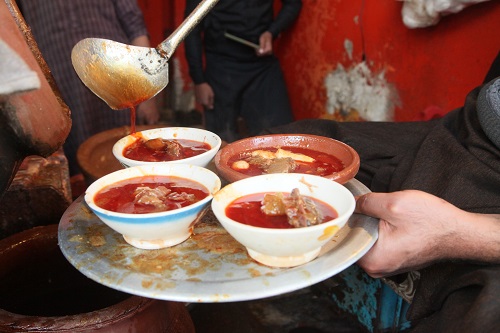
The walled city of Peshawar enjoys great significance for a myriad of reasons – not least of which is its cuisine. Other than its rich culture, traditions and architecture, the Khyber cuisine is one of these reasons where the food is not heavily spiced and the taste of the main ingredients (salt and animal fat) shines through.
Desi (native) breakfast options in Peshawar mostly include halwapuri (semolina pudding and soft fried dough) and paye (cow trotters). Although Peshawar has so many shops selling paye, Nikka is the most popular with the local folks as well as those visiting Peshawar from other parts of the province, other parts of the country and even other countries.
According to Umar Daraz, he is from the fifth generation in the family to run this breakfast eatery, established in the year 1826 by his forefathers. Locals call it “Nikka’s shop.” The eatery was named after paternal uncle of Umar’s father whose name was Fida Muhammad, but for being the youngest among his brothers, he used to be called Nikka, that means “the younger” in the Hindko language which is spoken in Peshawar and some other districts of Khyber Pakhtunkhwa such as Nowshera, Kohat, Haripur, Abbottabad and Mansehra, etc.
The walled city used to be surrounded by several main gates that served as the main entry points into the city. These gates became non-existent over time. Later some of them were restored in phases by the government. The gate restoration process was launched soon after the Awami National Party (ANP) and Pakistan People’s Party (PPP) formed a coalition government in the province in 2008.
Coming from the City Circular Road, you have to enter Lahori Gate, that is one of the eight restored gates of the walled city. The eatery is located at the southern side of the historical Gor Khatri, at a walking distance from the Heritage Trail that starts from the 112-year-old Cunningham Clock Tower or Ghanta Ghar.
 The eatery has seats for customers next to its kitchen and cooking space. Behind this chair and table arrangement, there is a small space with floor seating and curtains perhaps for families. But those wishing to enjoy eating while resting their backs against bolsters sit here – as women in this interior part of the conservative city do not come to such eateries.
The eatery has seats for customers next to its kitchen and cooking space. Behind this chair and table arrangement, there is a small space with floor seating and curtains perhaps for families. But those wishing to enjoy eating while resting their backs against bolsters sit here – as women in this interior part of the conservative city do not come to such eateries.
The process of cooking cow trotters is a long one: it takes 18 hours on a stove alone, while removing the hair from the foot and cutting of head meat is another time consuming task. While I visited them in the evening, three workers were busy in the kitchen compartment, dehairing trotters by dipping them in boiling hot water and peeling off the hair with sharp knives. Another one was cutting head meat that is added to payas.
There are various workers for each task, having separate duty timings. Talking to me the next (Sunday) morning, Umar says that in other days of the week they prepare 24 trotters while on Saturdays and Sundays, they double the quantity as the eatery witnesses more customers at weekends.
They start cooking at 2 pm every day, placing the trotters on low flame at night so the meat cooks in steam – just like the method for Rosh (a local meat dish). The gravy consists of 40 percent water while the rest is juices extracted from bones and meat while cooking on low flame. A worker is assigned the duty to look after the kitchen the whole night. They cook head meat separately and the gelatinous trotters separately – and all the while, they have placed a big clay container (fastened with steel wires so it may not break on flame) in a tilted position on fire to cook bones with marrow in them.
Umar says that he gets turmeric in solid form and dried red chilli from Thar area of Sindh province. He then gets them ground here to add purity and taste to the food. “Other than these two spices, we only add salt and black pepper to our recipe, as we care about the health of our consumers,” adds the man in his early 40s.
A small bowl of the dish is priced at 350 rupees, that is a single serving. A large bowl with two servings is at 700 rupees. The dish is served in an earthen glazed pot pouring head meat, the gelatinous part of the trotters and bone marrow and then adding red oily gravy to it. People have it with tandoori naan served in a plastic basket.
As people visit the place for breakfast, they also order black tea from a nearby beverage shop while some prefer green tea with ground cardamom as it speeds up the metabolism after they have a heavy and oily meal.
A veil-wearing old lady stands outside the shop’s exterior counter, holding a steel vessel. She asks for kalla (naan with gravy in Hindko). The man on the counter places small pieces of tandoori naan in the pot and adds gravy and meat to it.
“I come from the adjoining Mohalla Mullah Baaru (an adjacent old neighbourhood). We have this breakfast on Sundays. I used to visit this outlet with my father when I was a child and this tree existed there since then. I have gone old, but this tree has not,” she smile while pointing at an old Peepal tree with a thick trunk that exists on the pavement that leads to the eatery.
“Inflation has affected the purchasing power of people and ultimately our business. The customers who used to visit us daily now come once or twice a week”, Umar says while commenting on the ongoing price-spiral in the country.
Peshawar witnesses very hot, prolonged summers; and brief, mild to cool winters. Winter in Peshawar starts in November and ends in late March, though it sometimes extends into mid April, while the summer months are from mid-May to mid-September.
“As people consume less payas in summer season in this plain area due to them being seen as a 'hot' food, we used to get breakfast orders from rest houses in Murree hillside. But after the Covid pandemic, the rest houses’ business has got affected and they have stopped placing breakfast orders,” he explains.
Two liquefied petroleum gas (LPG) cylinders were lying in the kitchen portion. “We have a commercial natural gas connection, but due to country-wide gas shortage and its crisis, we consume almost 2,000 to 3,000 rupees’ worth of LPG daily – that is other than the gas consumption bill. This is an additional expense other than the salaries of our workers. Every single thing is getting costlier. Not to mention garlic and ginger prices, for these are a must staple of our recipe. If I increase the price, the customers get offended,” Umar continues.
He says that foreign tourists and people visiting Peshawar from other cities also visit the eatery. Trevor James, also known as The Food Ranger on YouTube, is a Canadian-born food and travel vlogger who has more than five million YouTube subscribers. He had also posted a vlog some two years back on Peshawari street food, which featured Nikka’s paye as well. In his vlog, he can be seen enjoying the scrumptious meal at the outlet.
Umar has been running the business since 2001. He has three sons and intends to pass on his family business to them. He wants to expand his business and open more branches of the eatery after his sons grow up and join him.
Desi (native) breakfast options in Peshawar mostly include halwapuri (semolina pudding and soft fried dough) and paye (cow trotters). Although Peshawar has so many shops selling paye, Nikka is the most popular with the local folks as well as those visiting Peshawar from other parts of the province, other parts of the country and even other countries.
According to Umar Daraz, he is from the fifth generation in the family to run this breakfast eatery, established in the year 1826 by his forefathers. Locals call it “Nikka’s shop.” The eatery was named after paternal uncle of Umar’s father whose name was Fida Muhammad, but for being the youngest among his brothers, he used to be called Nikka, that means “the younger” in the Hindko language which is spoken in Peshawar and some other districts of Khyber Pakhtunkhwa such as Nowshera, Kohat, Haripur, Abbottabad and Mansehra, etc.
The walled city used to be surrounded by several main gates that served as the main entry points into the city. These gates became non-existent over time. Later some of them were restored in phases by the government. The gate restoration process was launched soon after the Awami National Party (ANP) and Pakistan People’s Party (PPP) formed a coalition government in the province in 2008.
Coming from the City Circular Road, you have to enter Lahori Gate, that is one of the eight restored gates of the walled city. The eatery is located at the southern side of the historical Gor Khatri, at a walking distance from the Heritage Trail that starts from the 112-year-old Cunningham Clock Tower or Ghanta Ghar.
 The eatery has seats for customers next to its kitchen and cooking space. Behind this chair and table arrangement, there is a small space with floor seating and curtains perhaps for families. But those wishing to enjoy eating while resting their backs against bolsters sit here – as women in this interior part of the conservative city do not come to such eateries.
The eatery has seats for customers next to its kitchen and cooking space. Behind this chair and table arrangement, there is a small space with floor seating and curtains perhaps for families. But those wishing to enjoy eating while resting their backs against bolsters sit here – as women in this interior part of the conservative city do not come to such eateries.The process of cooking cow trotters is a long one: it takes 18 hours on a stove alone, while removing the hair from the foot and cutting of head meat is another time consuming task. While I visited them in the evening, three workers were busy in the kitchen compartment, dehairing trotters by dipping them in boiling hot water and peeling off the hair with sharp knives. Another one was cutting head meat that is added to payas.
“Inflation has affected the purchasing power of people and ultimately our business. The customers who used to visit us daily now come once or twice a week”, Umar says
There are various workers for each task, having separate duty timings. Talking to me the next (Sunday) morning, Umar says that in other days of the week they prepare 24 trotters while on Saturdays and Sundays, they double the quantity as the eatery witnesses more customers at weekends.
They start cooking at 2 pm every day, placing the trotters on low flame at night so the meat cooks in steam – just like the method for Rosh (a local meat dish). The gravy consists of 40 percent water while the rest is juices extracted from bones and meat while cooking on low flame. A worker is assigned the duty to look after the kitchen the whole night. They cook head meat separately and the gelatinous trotters separately – and all the while, they have placed a big clay container (fastened with steel wires so it may not break on flame) in a tilted position on fire to cook bones with marrow in them.
Umar says that he gets turmeric in solid form and dried red chilli from Thar area of Sindh province. He then gets them ground here to add purity and taste to the food. “Other than these two spices, we only add salt and black pepper to our recipe, as we care about the health of our consumers,” adds the man in his early 40s.
A small bowl of the dish is priced at 350 rupees, that is a single serving. A large bowl with two servings is at 700 rupees. The dish is served in an earthen glazed pot pouring head meat, the gelatinous part of the trotters and bone marrow and then adding red oily gravy to it. People have it with tandoori naan served in a plastic basket.
As people visit the place for breakfast, they also order black tea from a nearby beverage shop while some prefer green tea with ground cardamom as it speeds up the metabolism after they have a heavy and oily meal.
A veil-wearing old lady stands outside the shop’s exterior counter, holding a steel vessel. She asks for kalla (naan with gravy in Hindko). The man on the counter places small pieces of tandoori naan in the pot and adds gravy and meat to it.

“I come from the adjoining Mohalla Mullah Baaru (an adjacent old neighbourhood). We have this breakfast on Sundays. I used to visit this outlet with my father when I was a child and this tree existed there since then. I have gone old, but this tree has not,” she smile while pointing at an old Peepal tree with a thick trunk that exists on the pavement that leads to the eatery.
“Inflation has affected the purchasing power of people and ultimately our business. The customers who used to visit us daily now come once or twice a week”, Umar says while commenting on the ongoing price-spiral in the country.
Peshawar witnesses very hot, prolonged summers; and brief, mild to cool winters. Winter in Peshawar starts in November and ends in late March, though it sometimes extends into mid April, while the summer months are from mid-May to mid-September.
“As people consume less payas in summer season in this plain area due to them being seen as a 'hot' food, we used to get breakfast orders from rest houses in Murree hillside. But after the Covid pandemic, the rest houses’ business has got affected and they have stopped placing breakfast orders,” he explains.
Two liquefied petroleum gas (LPG) cylinders were lying in the kitchen portion. “We have a commercial natural gas connection, but due to country-wide gas shortage and its crisis, we consume almost 2,000 to 3,000 rupees’ worth of LPG daily – that is other than the gas consumption bill. This is an additional expense other than the salaries of our workers. Every single thing is getting costlier. Not to mention garlic and ginger prices, for these are a must staple of our recipe. If I increase the price, the customers get offended,” Umar continues.
He says that foreign tourists and people visiting Peshawar from other cities also visit the eatery. Trevor James, also known as The Food Ranger on YouTube, is a Canadian-born food and travel vlogger who has more than five million YouTube subscribers. He had also posted a vlog some two years back on Peshawari street food, which featured Nikka’s paye as well. In his vlog, he can be seen enjoying the scrumptious meal at the outlet.
Umar has been running the business since 2001. He has three sons and intends to pass on his family business to them. He wants to expand his business and open more branches of the eatery after his sons grow up and join him.

